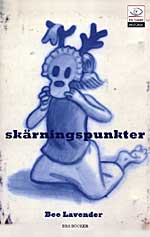translation
Check out the nifty translation prepared by my Swedish publisher:
4.26.06 aquatic
My battered knees are slowly healing and have now reached what could best be termed the crispy stage: I can get around, but it isn’t much fun to pedal.
I do not like being deprived of my daily bike rides, particularly on brilliant spring mornings. Though the river was quiet today and I could peer down and watch the fish squirming about in the green luminous water.
In my (vibrantly obsessive) childhood I refused to swim in fresh water because fish scared me. I also refused to eat them, for similar reasons. Now I am hugely entertained by the thought of the aquatic life all around me.
4.25.06 class
I’ve just finished reading The Likes of Us by Michael Collins, a remarkable book that should be assigned reading. While he describes a very particular version of working-class culture, there are many similarities between his description of English urban poverty and the rural American variety I grew up in.
Collins makes a consistent argument against the sort of journalistic slumming that puts middle-class people in contrived poverty situations to collect data and report back to a scandalized public that, you know, it really sucks to be poor.
The examples of this are legion, stretching back hundreds of years and continuing today; well-meaning, surely, but essentially irritating to anyone who has a legitimate working-class background because those journalists mucking about in our world can always leave.
They have comfortable lives to return to; they have a privileged background that (unless they starved themselves on purpose) generally included sufficient nutrition and medical care to assure their health will not be derailed by the experience.
Toward the end of the book he goes home to a neighborhood that has been social-engineered nearly out of existence and visits a few friends. A boy he grew up with looks him up and down and says I bet you ain’t got a mark on you.
When I go home I rarely see anyone from the old days. My friends, with few exceptions, have fled to distant cities. Those who would more easily be described as enemies are no longer recognizable; we met last in adolescence and seventeen years does change a person.
The place itself has been mangled by reckless suburban development schemes: the forest of my childhood has dwindled to a strip of trees separating a trailer park from a busy road.
When I see a familiar face, I am not even able to place a name or memory to the ghost. And I clearly look like what I am: a newly minted member of the educated professional middle-class. I do not have a mark on me, despite the scars, and this does not endear me to folks back home. I keep my mouth shut and move along.
Poverty in and of itself does not offer a class identity. Many people choose to live ascetically; others are knocked down by circumstance, and do not find community with those at the bottom. One of the most endearing things about The Likes of Us is the way the author concisely describes an autonomous, protective, and meaningful subculture of people looking after their own.
To be working-class is to enjoy a particular world view that cannot be manually replicated.
My own expulsion from that close-knit (and, yes, at times dangerous) subculture was accidental, and a by-product of both the cancer and the experience of becoming a teen parent. I needed a good job that would provide benefits, and that could not be obtained without a college education. One thing followed another; I am more surprised than anyone to find myself so far from home.
It is a privilege to be an adult who can cross the class divide and know people from different backgrounds. But it is an even greater luxury that I have found other class traitors wandering the world, people who respect their working-class antecedents and keep that rawness alive inside.
4.22.06 groping
Chloe will be visiting England soon (don’t forget about the event, Londoners!) and I felt obligated to warn her, as a fellow child of the Pacific Northwest, about a feature of UK life that I find shocking:
When the weather warms up, the parks turn into make-out central. People spread out their picnic blankets, pop open the champagne, and then proceed to roll around groping each other.
Now, it might just be Cambridge – I haven’t travelled much in this country – but it is an extraordinary sight.
Today was the first full-fledged example. It was still cold enough that I had to wear gloves, but huge numbers of people were in shorts and skimpy tops, lolling about in the fields by the Mill, congregating in droves on Jesus Green, necking! This is highly amusing, particularly if the participants are the corduroy-trousered academic types.
The English have a reputation for reticence but I guess that picnics must offer some kind of aphrodisiac. Or something.
4.21.06 heart
The appointment went exactly as predicted, except for one major caveat: Addenbrooke’s is without a doubt the best medical facility I have ever encountered. My experiences with the NHS have absolutely convinced me that socialized medicine is superior to market-based health care.
The quality of care is higher, the doctors more thoughtful, the system less rushed. I am aware of some of the problems, particularly for elderly and rural patients, but the fact that a major teaching hospital is so competent and kind is at least symbolic.
Except of course hand hygiene, but more on that later.
Various plans have been organized, not least of which is a repeat of the fancy DNA testing, which is marginally exciting. I’ve done it before but only with formal promises of confidentiality and destruction of the sample. Now that I live in a land where my genetic profile will not lead to discrimination in insurance and employment, sign me up!
Most of the facts discussed were known; the debates predictable (nobody else in the world has ever presented with my precise symptoms in combination, or any of said symptoms as an infant – I am nothing if not ambitious). The only new information I gleaned is the notion that I am at risk of developing heart fibromas.
Fun!
I still feel a distinct confusion over how any of this can be true. Will age and wisdom change that? Doubtful.
4.21.06 sleeves
One of the fundamental rules of chronic illness is look respectable and worthy of services when visiting the doctor.
This is difficult enough for me at the best of times; with a collection of tights decimated by cycling trauma, and a wardrobe appropriate either for mucking about on boats or performing in front of an audience, definitely a challenge.
But the main problem, of course, is the tattoo.
It honestly never occurred to me that anyone would treat me any differently because there is a picture on my arm. The first time it happened the tattoo was still fresh, I was in a museum in NYC, and a security guard decided to be my new best friend.
I thought that encounter was a fluke, but a very specific sort of muscled short-haired bouncer has been a constant presence ever since, all over the world. It happens at shows, at galleries, in the Lego aisle at Hamley’s.
This makes no sense to me, as my essential physical attributes (or as Moe used to say, skills) are exactly the same, and I wear mostly the same clothes. But apparently, if my arm is exposed, I am obligated to talk to strangers.
At first I had no tricks to defer the attention — the most significant example was the time I literally ran away from a guard at the Vatican, leaving a very amused Gabriel to inform the fellow that I am shy.
I nearly assaulted a bouncer in Hell’s Kitchen who wouldn’t let me leave a bar (I considered breaking his fingers but instead just… moved him aside). Eventually I learned to smile and answer questions before inching away: No, it didn’t hurt. I don’t know how long it took, maybe ten hours. I don’t know how much it cost, I didn’t pay for it. I had it done in a city far, far away. Um, okay, gotta go…
Waiters in France pet my hair and sing to me. Old navy vets glare. And of course there was the incident with the Holocaust survivor. These encounters, without exception, only happen if I have on short sleeves.
Covering up the arm for a hospital appointment, then, is critical. I need to find not only a clean, intact, modest garment – but one that reaches at least to my elbow.
Sigh.
At least it takes my mind off the fact that I do not enjoy being a first generation mutation.
4.20.06 bound
It was bound to happen sooner or later.
Cycling jauntily through town, baskets full of groceries, I moved to dismount … and for no apparent reason fell… into the middle of one of the busiest roads in the city.
Luckily I did not get run over, though both of my knees are smashed up. The injuries at a glance will not require emergency medical attention, though they are far worse than that time I went tumbling down the path at Kubota Gardens.
The only casualties so far are a head of lettuce and my last pair of intact tights.
Back to picking gravel out of my body.
4.18.06 fun
To shore up the impression that my life is just a nonstop whirlwind of fun, I would like to share that in a few days I get to have the special experience of hobnobbing with the staff of a medical genetics clinic.
And, although this will be my first encounter with said professionals in a UK hospital setting, the appointment will be predictable in all aspects. They will poke various bits of me as I verbally rattle through the checklist faster than they can remember what to ask.
I will flash a few scars, get photographed, and impress everyone with my astonishing grasp of a disease that I have, after all, lived with for thirty-five years. Whichever doctor is assigned my case will perhaps have met three or four other people with the diagnosis. Though usually, they’ve never seen a live specimen.
Not exactly my favorite adventure, but sometimes necessary in order to secure referrals to the specialist clinics that I have been avoiding for a few years now.
The best part of the process is filling out the family disease tree. This one was particularly hilarious before I even made it too far past the basics like age and address.
If you tick the “yes I have visited Genetics” box, they give you a space about the size of a matchbook to list where you have been seen previously. I conscientiously gave the full names of three major teaching hospitals, a military facility, and the clinical study I sometimes halfway cooperate with.
The space allocated for a list of cancer treatments was even smaller, leaving me no choice but to use the columns reserved for siblings to describe my assortment of maladies. After all, I have no siblings.
Ha! Take that, poorly designed form!
4.14.06 bucolic
I’ve lived in this town long enough to dread the start of tourist season, which roughly coincides with…. this weekend. There are tour groups throughout the year but as soon as the daffodils bloom the town is awash with strangers bumbling about taking photographs and impeding traffic. For the most part I avoid the city centre during the day, but the gawking crowds also enjoy the bucolic calm of the river (and so they should).
But they don’t just stroll by. They peer in my windows and, when they can catch me, ask impudent questions. Um, no, Stranger… you may not take a photograph. My boat and I are not on the list of approved local attractions.
Nor should you inquire how much a narrowboat costs, unless you wish to purchase one, in which case I can give you a few numbers of people who are currently selling.
My friend Sally lives in a thatched-roof cottage in a twee village nearby and she tells a funny story about waking one morning to find forty strangers assembled on her doorstep with easels, making paintings of her home.
This too would probably fall in the range of, at the very least, surreal, even if not technically intrusive. At least the cast members at theme parks get paychecks for dealing with this sort of scrutiny every day.
4.12.06 measure
When I first arrived in this country I was so nervous I could only just barely stay on my bicycle. It is a measure of how much I’ve changed that the other day I found myself pedaling at top speed down a narrow congested street, baskets laden with groceries, talking on a mobile phone and waving a wild hello at Magnus while somehow also keeping my skirt from blowing up around my ears.
4.11.06 sixteen
The day I graduated from high school I whiled away the tediously long ceremony at the county fairgrounds by ripping out the hem of my dress, a psychedelic blue and orange vintage thing with enormous pointy collars.
My mother had shortened it to match the white robe, but I had a foot of swirling color showing by the time I marched on stage, condoms pinned to my cap in protest against the school anti-sex-ed policy, to firmly shake the hand of a superintendent who knew me as the girl who would be happy to tangle the district in multiple lawsuits if not allowed to graduate on time.
Oh, and also because I had both failed my senior year and secured five merit scholarships. While graduating on time, with enough credits to have walked out a year earlier. What a conundrum.
After the ceremony I paused for a series of photographs with people I would mostly never see again, announced to assembled family members that I was not available for a celebratory dinner, grabbed the hand of my loathed boyfriend’s confused best friend, and scrambled away through the parking lot.
Dashing between dusty cars with a kid I didn’t care one bit about I saw David, who had been a good friend through numerous adolescent horrors, adventures, and schemes. David was a hilarious and clever boy who generously adopted one of my guinea pigs when I had to move out of the family house for awhile. I stopped only long enough to flash the favored hand gesture of the metal kids before jumping in my car and racing away.
Since then I’ve heard not one word from David, nor even any gossip about him, except the information that he moved out of the country. As a general rule those of us who banded together for safety at age thirteen severed our ties with each other, and our hometown, as soon as we were old enough to leave. It was well over a decade before a few people made tentative contact; the handful of friends who are back in my life have reinvented themselves almost beyond recognition.
If anyone had asked me in 1989 I would have predicted that most of us would die, or at the very least remain trapped by the poverty and despair of our gorgeous communal landscape. Very few people I knew back then have moved more than a hundred miles from home.
I find it quite odd that I live in England, let alone all of the other strange facts about my grownup life. I sincerely value the friends who made similar fairy-tale escapes, but for the most part I have to fly somewhere to visit them.
Imagine my surprise then to learn that David actually lives in London and, from all accounts, is a fabulous adult version of the boy I once knew.
Of course I’m not interested in reviewing the past, except for literary purposes, so the catch-up emails and texts have been quite minimal in terms of information; I can in fact cover sixteen years of lapsed friendship with a cryptic half-sentence.
But it is extremely nice to know that there is another exile from home nearby.
4.10.06 translation
I’m sitting here eating salty licorice and pondering the fact that Lessons in Taxidermy is being translated to Svenska. The book will be available in stores in Sweden later this year!
4.6.06 bristol
I had to scamper away to Bristol and Bath for the week; both were great fun, although I was felled by illness mid-trip and spent too much time bemoaning the fact that <i>it is not fair to get sick because I’ve had more than my share of the nonsense</i>.
Through the fog I did notice the exquisite beauty of the area…. I would love to take my boat to Bristol to moor! And not just because the city has great restaurants too. Anyway, home now, and trying to catch up on work and email and boat maintenance tasks.
4.1.06 images
Pussymouth was the emcee, the venue filled up with beautiful friends old and new, I was asked to sign a library card, a breast, and an ass – Portland always provides scads of fun. Some images from the event at In Other Words:
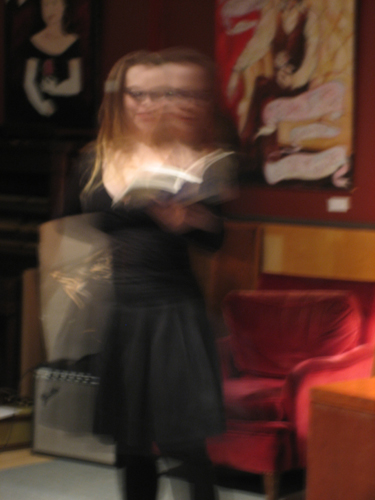
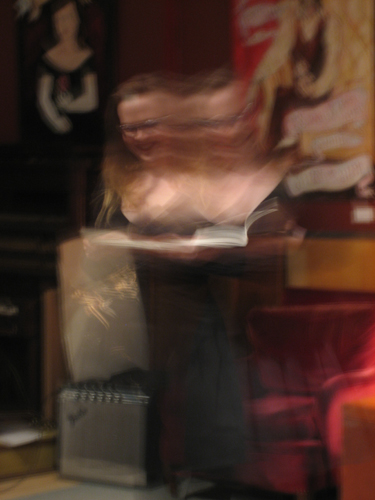
The audience – note defensive body language!

Marisa performed:
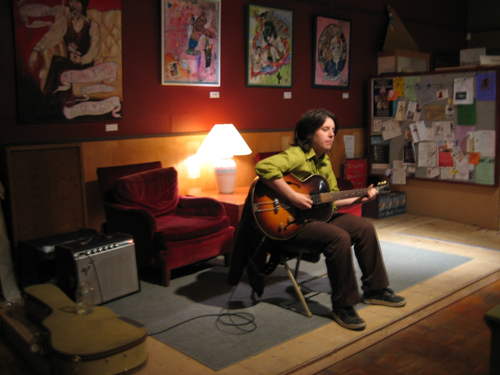
Then asked me for an autograph:
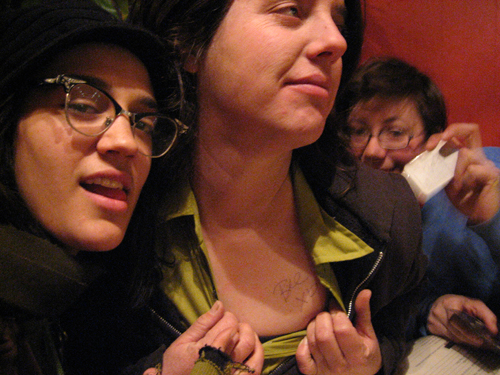
4.1.06 event
London! Check out this May event:
Stumptown Show & Tell
Thursday 4th May, 7.30pm
journal
- January 2020
- December 2019
- September 2019
- August 2019
- July 2019
- June 2019
- May 2019
- April 2019
- March 2019
- February 2019
- January 2019
- December 2018
- November 2018
- October 2018
- September 2018
- August 2018
- July 2018
- June 2018
- May 2018
- April 2018
- March 2018
- January 2018
- December 2017
- November 2017
- October 2017
- September 2017
- August 2017
- July 2017
- June 2017
- May 2017
- April 2017
- March 2017
- February 2017
- January 2017
- December 2016
- November 2016
- October 2016
- September 2016
- August 2016
- July 2016
- June 2016
- May 2016
- April 2016
- March 2016
- February 2016
- January 2016
- December 2015
- November 2015
- October 2015
- September 2015
- August 2015
- July 2015
- June 2015
- May 2015
- April 2015
- March 2015
- February 2015
- July 2013
- June 2012
- May 2012
- April 2012
- March 2012
- February 2012
- September 2010
- August 2010
- July 2010
- June 2010
- May 2010
- April 2010
- March 2010
- February 2010
- January 2010
- December 2009
- November 2009
- October 2009
- September 2009
- August 2009
- July 2009
- June 2009
- May 2009
- April 2009
- March 2009
- February 2009
- January 2009
- December 2008
- November 2008
- October 2008
- September 2008
- August 2008
- July 2008
- June 2008
- May 2008
- April 2008
- March 2008
- February 2008
- January 2008
- December 2007
- November 2007
- October 2007
- September 2007
- August 2007
- July 2007
- June 2007
- May 2007
- April 2007
- March 2007
- February 2007
- January 2007
- December 2006
- November 2006
- October 2006
- September 2006
- August 2006
- July 2006
- June 2006
- May 2006
- April 2006
- March 2006
- February 2006
- January 2006
- December 2005
- November 2005
- October 2005
- September 2005
- August 2005
- July 2005
- June 2005
- May 2005
- April 2005
- March 2005
- February 2005
- January 2005
- December 2004
- November 2004
- October 2004
- September 2004
- August 2004
- July 2004
- June 2004
- May 2004
- April 2004
- March 2004
- February 2004
- January 2004
- December 2003
- November 2003
- October 2003
